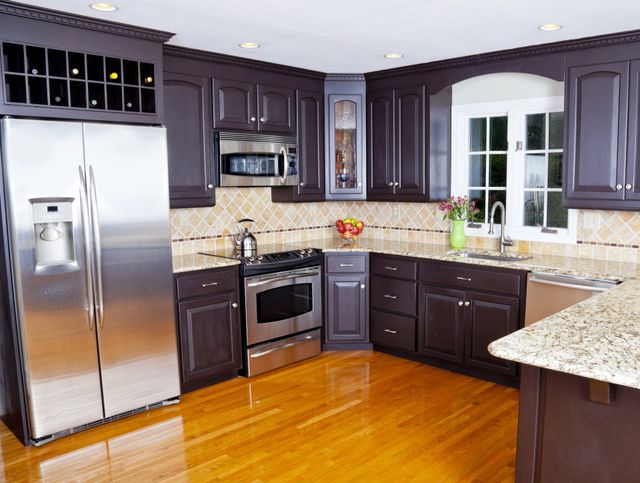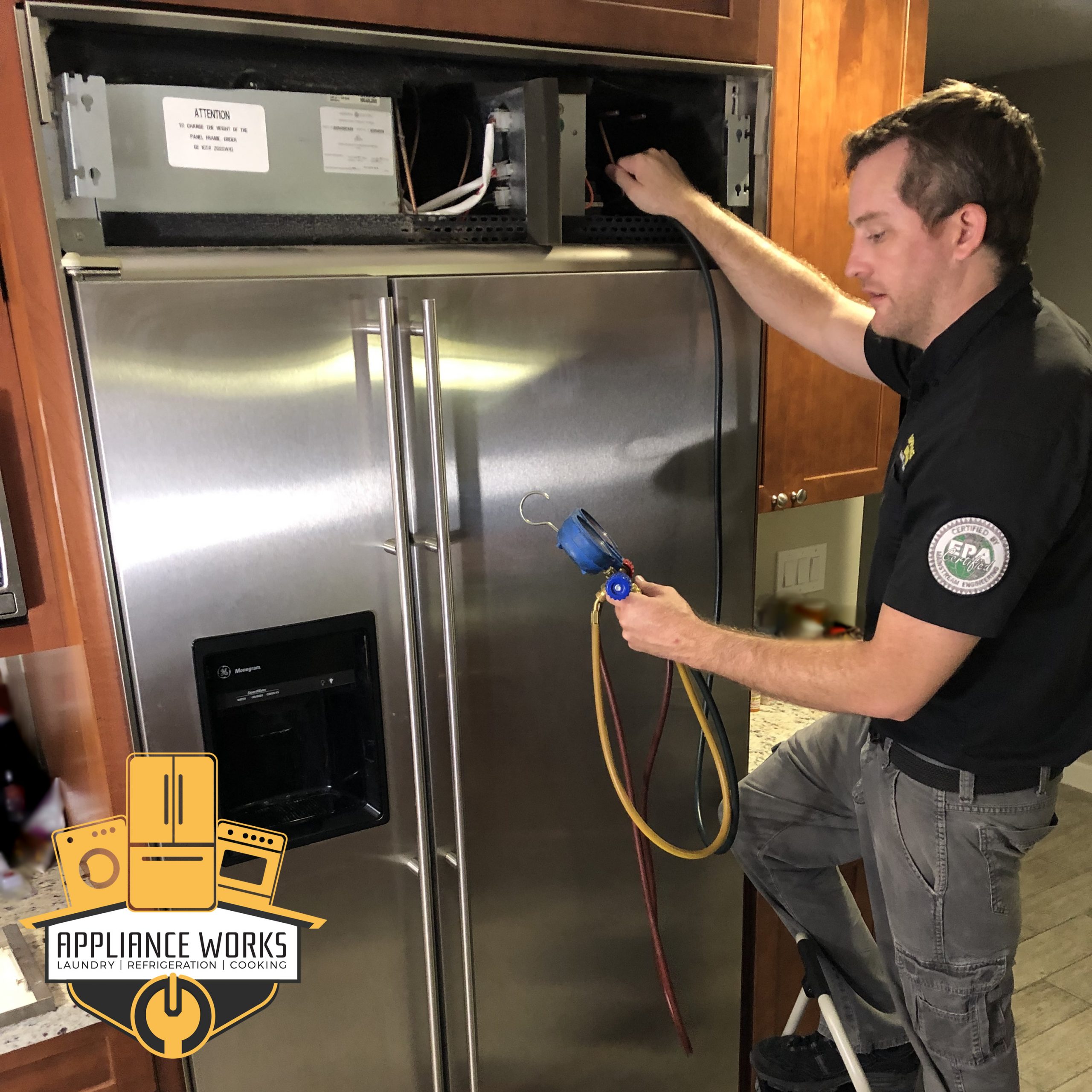Protect Your Investment with Dependable Refrigeration & Appliance Repair Service LG Appliance Repair's Expert Touch
Protect Your Investment with Dependable Refrigeration & Appliance Repair Service LG Appliance Repair's Expert Touch
Blog Article
Crucial Tips for Effective Ref Repair Work to Extend Home Appliance Life-span
When it comes to your refrigerator, proper repair service and upkeep are vital for durability. Recognizing usual problems and understanding when to act can make all the distinction.
Recognizing Usual Fridge Problems
Fridges are essential in keeping your food fresh, yet they can come across a range of usual problems that disrupt their efficiency. One frequent concern is poor cooling. If you notice food spoiling quicker than normal, examine the thermostat settings or take into consideration if the door seals are damaged. An additional usual problem is extreme sound, which could suggest a malfunctioning compressor or a stopping working fan. You might additionally experience water merging inside or beneath the fridge; this typically results from a blocked defrost drainpipe or a damaged water line. In addition, if your fridge's light isn't working, it could be a straightforward light bulb issue or a trouble with the door switch. Ice accumulation in the fridge freezer can impede air movement and cooling down effectiveness. Recognizing these problems early can conserve you money and time out of commission, guaranteeing your fridge runs efficiently and effectively.
Routine Maintenance Practices
To maintain your appliances running efficiently, you need to remain on top of routine upkeep practices. Clean the condenser coils, examine the door seals, and keep an eye on the temperature level settings to ensure peak efficiency. These easy jobs can conserve you money and time on repair services down the line.
Tidy Condenser Coils Consistently
Cleaning your condenser coils consistently can considerably boost your appliance's performance. Dust and dirt construct up on these coils over time, causing your appliance to work more challenging and consume even more energy. To keep them tidy, unplug your appliance and meticulously get rid of any protective covers. Utilize a vacuum with a brush accessory or a soft brush to delicately get rid of particles. If required, a mixture of warm water and mild detergent can assist remove stubborn gunk. Make certain to let whatever completely dry completely before reconstructing and connecting the appliance back in. Goal to cleanse your coils at least twice a year, or much more often if you have pet dogs or stay in a dirty environment. This simple job can extend the life-span of your home appliance significantly.
Inspect Door Seals
3 simple steps can help you ensure your appliance's door seals remain in excellent problem. Evaluate the seals routinely for any fractures, splits, or signs of wear. These problems can lead to air leaks, impacting performance. 2nd, clean the seals utilizing warm, soapy water to eliminate any particles or gunk. A tidy seal guarantees a limited fit and better efficiency. Do a straightforward test by closing the door on an item of paper. If you can easily pull it out without resistance, the seal might need changing. By following these actions, you'll maintain your home appliance's effectiveness and longevity, saving you cash on energy expenses and repairs in the future.
Monitor Temperature Settings
Frequently checking your home appliance's temperature setups is crucial for ideal efficiency and efficiency. Whether you're dealing with a refrigerator, fridge freezer, or oven, maintaining an eye on these setups can avoid numerous issues. For fridges, go for temperatures in between 35 ° F and 38 ° F; for freezers, stick around 0 ° F. If the temperature levels are too expensive or low, your device might work harder, wasting power and shortening its lifespan. Make use of a thermostat to check these settings on a regular basis, particularly after significant adjustments, like relocating your home appliance or adjusting the thermostat. If you notice fluctuations, change the setups as necessary and speak with the customer handbook for assistance. By staying positive concerning temperature level monitoring, you'll assure your home appliances run smoothly and last longer.
Repairing Cooling Issues
When your fridge isn't cooling down appropriately, it can lead to ruined food and threw away cash, so dealing with the problem without delay is important. Beginning by examining the temperature settings to validate they go to the recommended levels, typically around 37 ° F for the refrigerator and 0 ° F for the fridge freezer. If the setups are correct, examine the door seals for any type of voids or damages; a faulty seal can enable cozy air to enter.
Following, examine the vents inside the fridge and fridge freezer. Confirm they're not obstructed by food items, as this can interfere with airflow. Pay attention for the compressor; if it's not running or making unusual noises, it might need focus. Check the condenser coils, typically located at the back or base of the system. Dust and debris can accumulate, causing cooling concerns. Tidy them with a vacuum cleaner or brush to maximize efficiency. If issues persist, it may be time to call a professional.
Dealing With Water Leakage and Ice Accumulation
If you're managing water leakage or ice accumulation in your home appliance, it's necessary to determine the source of the problem. By determining where the water is originating from, you can avoid further concerns and prevent costly repairs. Allow's check out some effective techniques to deal with these common problems.
Identify Leakage Resources
How can you properly determine the resources of water leak and ice build-up in your home appliances? Beginning by examining the seals and gaskets on your refrigerator and freezer doors. A worn or damaged seal can allow warm air to enter, triggering condensation and ice. Next off, examine the drain frying pan and drain system for clogs or obstructions; a backed-up drain can bring about water pooling. Seek any type of loosened connections in the water system line, which can produce leaks. Likewise, check out the defrost drain for ice build-up, which could interrupt correct drainage. By systematically examining these areas, you'll determine the source of the problem, permitting you to take the essential steps to fix it and prolong your appliance's life expectancy.
Prevent Ice Formation
To stop ice formation in your home appliances, beginning by verifying the temperature setups are ideal. If your fridge or freezer is too cool, it can lead to excessive ice accumulation. Inspect the door seals regularly; harmed seals can allow warm air in, creating condensation and ice formation.
Maintain the home appliance well-ventilated and prevent congestion, as this can block air movement - Washing Machine Repair Dependable Refrigeration & Appliance Repair Service. Routinely thaw your freezer if it doesn't have an automated defrost function.
If you notice water leak, pacific coast appliance repair determine and take care of any kind of obstructed drainage openings, as they can add to ice accumulation. Ultimately, tidy the coils and verify they're working properly to preserve peak performance. Taking these steps will discover here aid prolong your home appliance's life expectancy and efficiency.
Addressing Noisy Fridge Appears
While it could seem worrying, a noisy refrigerator commonly signifies small problems rather than significant breakdowns. Initially, identify the resource of the sound. Typical offenders consist of the compressor, fans, and water lines. If you listen to a buzzing audio, it could be the compressor striving; this might just be a regular operation audio.
Following, check for loosened things inside. Sometimes, containers or shelves can rattle, producing undesirable sound. Tighten up or rearrange them to remove the audios.
If you notice a clicking sound, it could be the defrost timer. This is commonly safe but might indicate it requires inspection.
Ultimately, confirm your refrigerator is level. An unbalanced device can produce resonances and noise. Make use of a degree to check, and adjust the feet if required. Addressing these concerns promptly can aid maintain your fridge's efficiency and prolong its life expectancy.
When to Replace Components vs. Full Substitute

Nonetheless, if your home appliance is older and experiencing numerous issues, a full replacement might be much more economical. Take into consideration the cost of fixings versus the home appliance's worth. If fixings exceed 50% of a new system's price, it's generally smarter to invest in a replacement. Furthermore, if you notice ongoing issues that maintain persisting, it's an indicator that your home appliance has reached completion of its life. Consider these factors very carefully to make the very best decision for your requirements and spending plan.
Knowing When to Call an Expert
Just how can you tell when it's time to call in a specialist for home appliance fixing? If your device stops working altogether or frequently journeys circuit breakers, it's another red flag.
You ought to additionally consider your own convenience degree with fixings. If you're unclear concerning identifying the problem or lack the right devices, it's ideal to connect for help. Remember, trying challenging repair work can result in even more damages or perhaps safety and security dangers.

Frequently Asked Concerns
How Usually Should I Clean the Fridge Coils?
You ought to cleanse your refrigerator coils every 6 months. This helps preserve performance and stops overheating. If you observe excessive dirt or animal hair, tidy them extra regularly to assure your refrigerator runs efficiently.

Can I Make Use Of Vinegar for Cleaning My Fridge?
Yes, you can utilize vinegar to clean your fridge! It's an excellent all-natural cleaner that hood repair eliminates smells and stains. Dependable Refrigeration & Appliance Repair Refrigerator repair specialist of Oro Valley. Simply blend it with water, use it to surface areas, and clean down for a fresh, clean fridge
What Temperature Should My Fridge Be Establish To?
You ought to establish your refrigerator to 37 ° F(3 ° C) for perfect food conservation. This temperature maintains your food fresh while avoiding wasting, guaranteeing your groceries last much longer and lowering waste. It's a very easy adjustment you can make!
Does a Fridge Required to Be Leveled?
Yes, your refrigerator requires to be leveled. If it's unequal, it can impact cooling down performance and create excess sound. Examine the leveling legs and change them to ensure correct equilibrium for optimal performance.
How Can I Lower Fridge Power Usage?
To reduce your fridge's energy usage, maintain it tidy and well-ventilated, inspect door seals for leaks, established the temperature between 35-38 ° F, and stay clear of straining it. These steps can considerably decrease your power bills.
Report this page